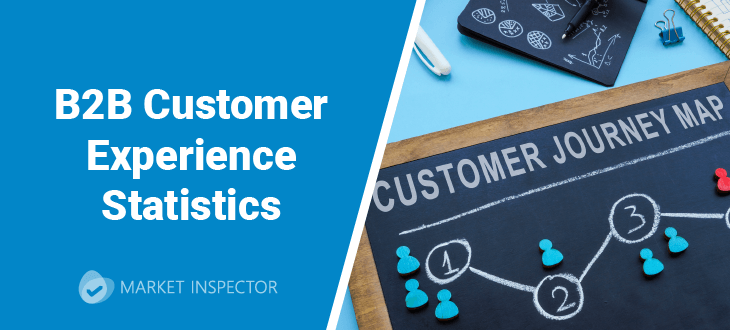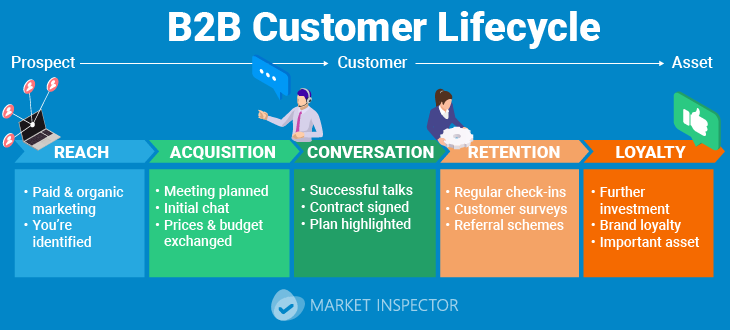- Market-Inspector.co.uk
- Blog
- B2B Customer Experience Statistics
B2B Customer Experience Statistics


What is B2B customer experience?
B2B (Business to Business) customer experience is the relationship between two businesses, where at least one is purchasing a service or product from the other. This differs from B2C, as in business to consumer you are often dealing with an individual customer, but in B2B there are often multiple stakeholders, directors and departments. This can make the relationship much more complicated, therefore making it harder to create a positive customer experience.
B2B customer lifecycle

Reach: This is the stage where the potential customer has identified they need to invest in a certain area of their business, and are currently deliberating. They would have identified you from either your good SEO ranking, social media marketing or other methods. You will know when you’ve successfully passed this stage when the customer contacts you for prices and further information.
Acquisition: When you set up a call with the customer, this is the acquisition phase. This is an initial chat about what they are looking for and whether you can offer it to them. You will answer any questions they might have, and then ask them questions to get more insight into their business. A good website will make this process easier, they will be able to research your company and the fees that you charge to ensure you aren’t wasting each other's time.
Conversion: The talks have gone well, and they’ve signed the contract and are now officially your customer. Here you might want to show them the calendar you’ve created highlighting what activity you’re going to be doing relating to them over the next six months to a year. You should never let your guard down, as now it’s all about retention, retention, retention.
Retention: Keep checking in with the customer, and make sure that they are happy with the service you are providing. Schedule regular meetings to ensure this, and always flag any concerns you may have. Send out customer surveys which will give you a better understanding of where you’re going right and wrong. Offer referral schemes if they are satisfied with your performance, this could bring you more customers and increase your revenue.
Loyalty: The customer might now be looking to invest more money into the same thing, due to the good relationship you’ve built they will choose you. You’ve made them feel like a valued customer and feel a sense of loyalty towards you and your business. Due to your hard work over the previous four stages, you’ve created strong brand loyalty which makes this customer one of your most important assets.
Ten B2B customer experience statistics
- When making purchasing decisions, customer experience is on the minds of 73% of customers.
- 86% of buyers are willing to pay more money for a better customer experience.
- One-third of customers will cut ties with a business after only one bad experience.
- 48% of customers expect special treatment for being a loyal customer.
- Companies that put their main focus on customer experience see an 80% rise in revenue.
- 90% of B2B customers first use the internet to find businesses to work with.
- 57% of customers won’t use a business with a poorly designed website.
- Fast response times contribute to great customer service according to 75% of businesses.
- 9 out of 10 businesses are competing on purely customer experience alone.
- Reading a positive review would make 92% of B2B customers more likely to choose that company.
How to deliver a good B2B sales experience?
Don’t be ‘pushy’
Persistence is important when it comes to sales, however, there’s a fine line between that and being pushy. Pushy comes across as desperate or that you’re trying to scam the person you’re pitching to, it can seriously damage your personal and business reputation.
B2B sales often contain more money, the person you are trying to sell to needs to completely trust you. Just the slightest red flag might be enough for them to take their money elsewhere. You aim to build a long-lasting relationship, not just to flog them something. Give them a gentle nudge, for example, ‘If you’re interested we ideally need to know by the end of the day on Friday, take some time to think and let us know if you have any questions’.
Be clear
Make sure that your pitch is clear when delivering to a client. Think about what questions they’d ask and make sure you’ve either answered it in your pitch or have prepared an answer. If something is confusing, or you can’t answer then this might lose you the sale.
Speak clearly and be easy to understand, don’t feel offended if a potential customer asks you to repeat what you’ve said. It’s common for internet connections to drop and for parts to be missed so you must make sure that you get every point across.
Listen
Before you’ve even got on a call with a client, take a good look at what they’ve said to you. In their initial conversation, they’ll often give several hints as to what they are looking for. Take this onboard with your planning as this can link to you being more flexible for them as a client. During the sales pitch, listen to the feedback they give. This will help you when it comes to performance later down the line. Note down their expectations so both parties are on the same wavelength.
Ask questions
Another thing to take into account before you start the call is what you want to find out about them. Write down bullet points of the key information you need to know and tick them off once you find out. Then at the end, you can look down and see if there are any key questions you need to ask. One of the biggest regrets for businesses when meeting clients is forgetting to ask them crucial questions.
If they answer every point you have noted down, still make sure to ask questions anyway. This will make you look engaged in the conversation, it will show you care for their business and want as much information to do as good a job as possible.
Fast process
According to a Forbes article, 52% of B2B buyers say the buying cycle for new purchases has gotten longer. So stand out from your competitors by making the process quick and easy for any onboarding clients. Eliminate inefficient meetings and bring in protocols that will increase speed during selling. This will benefit the client, but will also benefit your business as you’ll find yourself with more time to tackle other tasks.
Be multi-channel
Some industries can be very competitive to the point that it is intimidating for those looking to pick between competitors. Give your business the best chance by diversifying the platforms you use to attract new business opportunities. Examples include; Social media platforms, LinkedIn, Paid Media, Traditional Public Relations, TV, Radio, Thought Leadership, Webinars and email.
Five ways to improve B2B customer service
1. Regular Communication
Regular communication is crucial when it comes to B2B services, silence can often be associated with inactivity to clients which makes them think you’re not doing any work. Keep them informed by setting up weekly, or bi-weekly meetings. This results in everyone being on board with what is happening and makes your client feel valued.
Send messages regularly asking them questions for their input on things, this will help you build a more personal relationship. Allowing you to understand them a lot more. Good applications for communication include; Google Chat and Slack which are hugely popular in the business sector.
2. Celebrate Wins
Something a lot of people are guilty of is not celebrating their wins enough. Send clients all of your successes, as without this they won’t know if you’re doing a good job. Continually reminding them of your good work makes them more likely to extend any contract or simply do business with your company for longer. This can be a reason for clients dropping businesses as they aren’t seeing the value for money from their investment. You may have done fantastic work, but if you haven’t clearly explained those wins to them, then they might become annoyed or frustrated.
3. Offer Contract Clauses
Signing contracts can be a nervy experience for any company, it’s a legally binding document that you have to deliver. For clients that results in big pressure, marketing departments for example will be given a budget from higher up. So to relieve any stress, offer contract clauses at the halfway mark that allows them to discontinue if they choose to. This gives them a level of trust in you, as you’re showing confidence in your own ability that they won’t want to leave.
4. In-person Visits
In-person visits are a great way to build a good business relationship. Invite clients to your head office for a day where you talk to them about your plans, and give them a tour. This is becoming rarer in the day of online video calls, but being face-to-face allows you to understand someone's personality. The more you get on with someone at a personal level, there’s more chance you’ll work well professionally.
5. Be Honest
Sometimes things don’t go as well as expected, but the most important thing is to remain honest. Don’t lie to hide this, but instead, explain your thoughts about why things aren’t going as well as they could be. Clients will be more annoyed if they find out that you’ve lied, than if you’re straight up. They normally recognise that things can be complicated and could be out of your control. It also allows you to work out any problems in the relationship, one party might not be communicating at their best, so being honest addresses this.

Valli is the Digital PR & SEO Manager at Market Inspector. She has an educational background in business management and marketing. She is a passionate digital marketer and enjoys building her skills within SEO, online marketing and PR. She holds over 5 years of experience in creating content, B2B marketing, link building and digital networking. Her focus lies in the areas of business, marketing, green energy and sustainability, to name a few. Her work has been published in various media such as Entrepreneur, Business Insider, Creativebloq, Designtaxi, and more.
We strive to connect our customers with the right product and supplier. Would you like to be part of Market Inspector?

